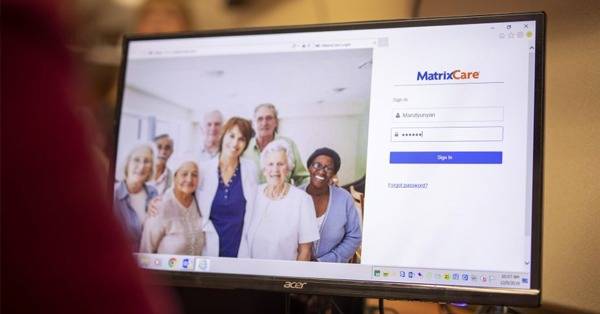- Solutions
- Solutions
- Home Health
- Hospice
- Life Plan Community
- Palliative Care
- Private Duty
- Senior Living
- Skilled Nursing
- Skilled Nursing
- Skilled Nursing Software
- Advanced Insights
- Customer relationship management
- Data and analytics
- Financial & operations management
- Marketing
- Nutrition management
- Referral management
- Regulatory compliance
- Retail management
- Resident engagement
- Revenue cycle management
- Skilled nursing interoperability
- Partners
- Blogs
- Resources
- About
- User Conference

Updating your healthcare employee retention strategies for 2022-23
Healthcare employee retention is at an all-time low. “The Great Resignation,” as experts are calling it, has hit the industry harder than most others. The result? A loss of 20% of the healthcare workforce over the two years from March 2020 to March 2022, including 30% of all nurses, according to an analysis by HealthLeaders.
Investopedia attributes this surge in turnover in the healthcare sector to Covid-19 and its impact not just on the industry and larger economy, but also on the workers themselves. This is supported by a September 2021 McKinsey report finding that 42% of healthcare and social workers who quit their jobs did so even before even landing a new one.
The resulting shortage of available staff—especially nurses—extends from hospitals and health centers to home care, senior living, and skilled nursing facilities, with the latter, particularly hard hit. Given this shortage, what healthcare employee retention strategies can leaders employ to help mitigate the effects of the Great Resignation in the months and years to come?
Healthcare employee retention strategies for 2022, step 1: Take the offensive
As the Vice President and leader of the “People strategy” for MatrixCare, managers often come to me asking if they can offer a retention bonus to keep an employee from leaving. Unfortunately, though, this approach doesn’t address the root problem and doesn’t typically work.
A retention bonus is usually a defensive move. It doesn’t address the fundamental problem of why workers are leaving in the first place. On top of that, the employee can usually find something more attractive than the bonus you offer with another company. It doesn’t create long-term loyalty.
Instead of reactive tactics like retention bonuses, then, leaders should go on the offensive with proactive, forward-thinking employee retention strategies. This involves actually getting together with each of your team members, getting to know what it is they really want in their job, and then working to adapt your culture and environment to meet that standard.
Some refer to these one-on-one meetings as growth conversations or stay conversations—an attempt to hold the exit interview before the employee leaves, to find out how to keep them. Whatever they’re called, the idea is to make a point to speak with each employee and learn what’s most important to them, and to find out what needs may be going unmet.
“What skills or strengths are you not using enough? What do you like best about our culture? Where do you feel that it’s lacking? What type of work energizes you the most, and how can we emphasize that on a day-to-day basis? What could another employer offer you that would make you consider leaving?”
These types of questions may seem obvious, but they’re too rarely discussed between employees and managers. Oftentimes, just asking them is helpful in nurturing employee satisfaction. And finding the answers to them will give you the info you need to keep your best workers while building out the kind of culture that attracts others.
Creating an effective employee retention strategy: 3 essential questions to ask
Using this approach, the top three reasons people give for pursuing new opportunities are growth and development, flexibility, and compensation and benefits. Simply put, employers who offer these elements are more likely to retain workers and create an environment that will attract others. And the best way to get effective, actionable insights for each of these topics is to ask your workers the right questions.
“What do growth and development mean for you?” A big reason why people leave is a lack of growth and development. Yet, everybody has a different perspective on just what that means. Don’t assume that you know—ask each person how they define it, whether or not they’re achieving it, and how you can help with experiential, education, or training opportunities.
“What flexibility do you need to be happy?” Especially since the pandemic struck, flexibility is more in-demand than ever among workers. Whether it’s the option to work different hours or shifts or take an occasional leave, flexibility also means different things to different people. Opening a dialogue on the topic will help you implement the best possible individual solutions or even organization-wide policy.
“What’s your ideal level of compensation?” Compensation and benefits seem like a no-brainer—after all, the culture won’t feel satisfactory to employees if they don’t think their work is fairly compensated. And you may be surprised at how little it can take for another company to win away your top workers.
Even a small salary update or additional benefit could make your team workers feel valued enough to disregard overtures from recruiters and your rivals. So, it’s important to understand how they feel about their compensation and what parts are most important to them so you focus your resources on what they care about.
Challenging times call for innovative healthcare employee retention strategies
Of course, not even the greatest healthcare employee retention strategies will always succeed. Some employees will inevitably leave. But if you’re concerned with keeping your top talent on board during this difficult time, taking an offensive approach and opening this new type of dialogue is a solid way to boost your chances of long-term retention and loyalty.
And remember, it’s harder for employees to start a new job at a new company than it is to stay in their current role. Taking the time to understand what each one wants, and then helping make sure those needs are met, could be the deciding factor in keeping your organization or facility fully staffed with happy, satisfied employees.
Looking for help implementing the healthcare employee retention strategies you need to succeed?
See what MatrixCare can do for you
Stephanie Walsh
At MatrixCare, our most valuable asset is our people. Stephanie leads the overall People strategy ensuring current and future talent needs are met, while striving to provide an outstanding employee experience that prioritizes growth and development. She brings more than two decades of human resources experience with a successful track record of leading organizational transformation.
A 10-year ResMed veteran, Stephanie has held many leadership roles in talent acquisition, talent management, and business partnering across ResMed. Prior to ResMed, she spent her career in many fast-growing life sciences companies, including Illumina and Invitrogen.
Stephanie holds a degree in Psychology and Business Management from Indiana University.
Related Posts




See MatrixCare in action
Start by having a call with one of our experts to see our platform in action.
MatrixCare offers industry-leading software solutions. Thousands of facility-based and home-based care organizations trust us to help them improve efficiency and provide exceptional care.




